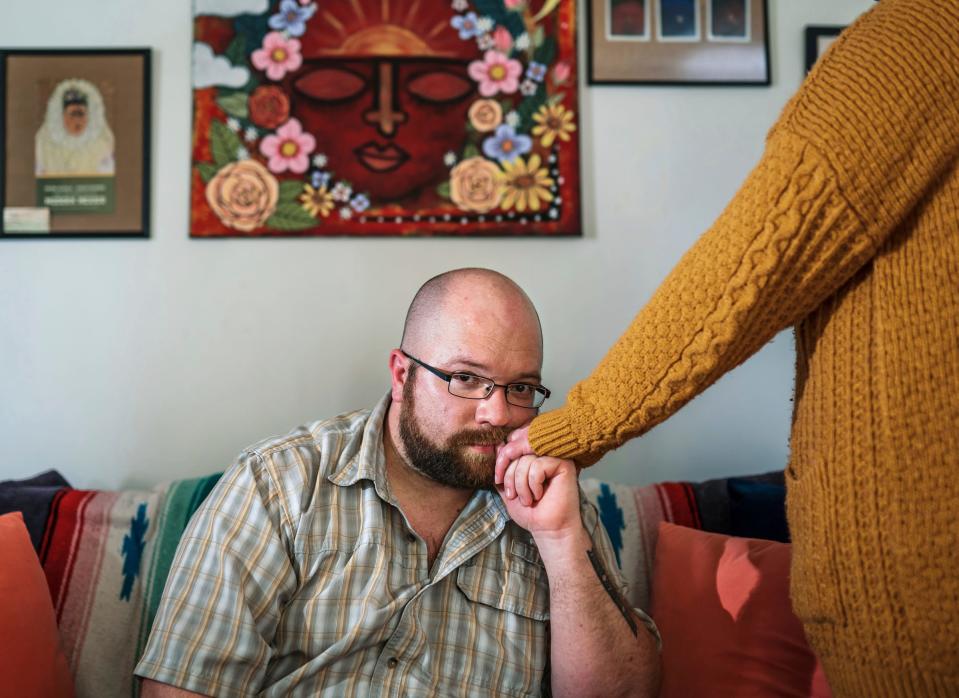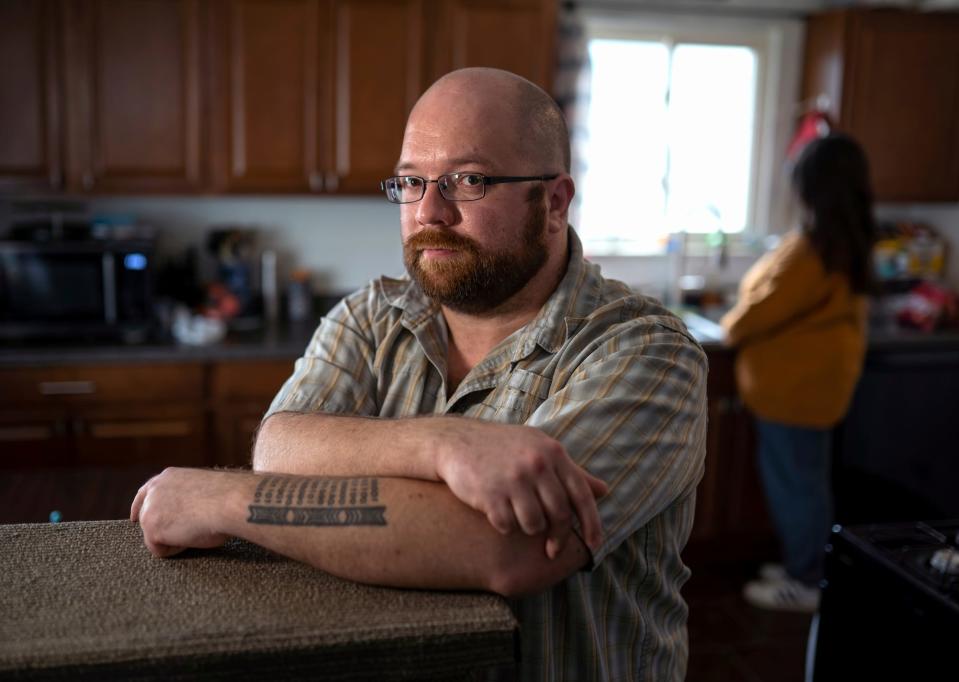When psychiatric patients allege abuse, hospitals investigate themselves
More often than not, investigating claims of abuse and neglectof psychiatric patients in Michigan hospitals is just a part-time job.
Records from the Michigan Department of Health and Human Services show that almost two-thirds of all private hospitals that treat psychiatric patients had employees assigned part time — not full time — to investigate complaints about patient mistreatment.
Advocates say some hospitals need to spend more time looking into allegations of abuse, neglect and other kinds of mistreatment.
Michigan law requires private hospitals to conduct a prompt, fair and thorough investigation when psychiatric patients complain their rights were violated, a system known as recipient rights.
State law prohibits a recipient rights director from having a direct role in patient care to help avoid conflicts of interest. But there is nothing to stop a recipient rights investigator from also working in quality control or risk management at a hospital, said Jonathan Bennett, the former recipient rights director at the Northern Lakes Community Mental Health Authority in Traverse City and now an independent patient rights advocate.
"The rights protection system is inherently fraught with conflicts of interest," Bennett said. "It doesn'thave the independence necessary to do investigations free from undue pressures."
Bennett added thatpatients need strong rights protection because they are especially vulnerable — they may haveattempted suicide or had suicidal thoughts, delusions or aggressive behaviors.
And if recipient rights officers spend only a fraction of their time protecting patients, Bennett said, "they're not out there talking to people and preemptively looking at the kinds of violations that can happen."
Thousands of people in Michigan are hospitalized every year with mental illness or other psychiatric conditions and are entitled to protection while admitted. State records show there were more than 70,000 admissions at licensed private hospitals last year, and more than 8,000 admissions at the five state-run psychiatric hospitals.
The Free Press also found that the hospitals with the most patients don't always have a full-time recipient rights officer. According to state records, three of the 12 hospitals with the greatest number of admissions in fiscal 2021 had someone assigned only part time to deal with recipient rights.
Yet some of the hospitals or psychiatric units with fewer patients had someone assigned to rights investigations full time, according to figures compiled by the state Office of Recipient Rights.
By contrast, 44 of the state's 46 community mental health agencies, which oversee behavioral health services, had at least the equivalent of a full-time rights officer, state records show.
Lynn Sutfin, a spokeswoman for the Michigan Department of Health and Human Services, said hospitals do spend less time on recipient rights work than the state's community mental health agencies. But she cited the small number of beds at some hospitals' psychiatric units. She said the state Office of Recipient Rights is "currently assessing" the rights systems within private hospitals.
“The decision on how to allocate the duties within the recipient rights office is an internal staffing decision made by each hospital based on a variety of staffing factors," said John Karasinski, director of communications for the Michigan Health & Hospital Association.
"Internal hospital staff are mandated by state law to report and investigate allegations of rights violations. The percentage of an employee’s responsibilities explicitly towards recipient rights does not indicate a facility’s ability to appropriately respond to allegations of rights violations,” Karasinski said in a statement.
Mark Reinstein, who retired in 2020 from the Mental Health Association in Michigan after 18 years as president, said state officials should investigate the uneven staffing. Low staffing levels, Reinstein said, may indicate a hospital doesn't take recipient rights seriously.
He said hospitals should not be allowed to be both "judge and jury" when there's abuse.
In addition to the private hospitals, Michigan has five-state run hospitals. The state Office of Recipient Rights investigates patient complaints in those hospitals.
But even then, there have been problems. In a 2014 report, the Michigan Office of the Auditor General found that the state recipient rights office failed to open investigations immediately as required after receiving complaints alleging abuse and neglect at the those hospitals.
In its response to the audit, the Department of Community Health said the state's recipient rights office met with its field staff to ensure they understood the rules. The office also revised its procedures to clarify and update the investigative process.
More: Deaths connected to Beaumont psychiatric unit in Farmington Hills are most in Michigan
More: Beaumont psychiatric hospital in Dearborn to be run by company with controversial past
More:'Totally broken': Investigation reveals big flaws in Michigan's mental health oversight
Just as staffing levels vary from hospital to hospital, so do the number of investigations. Three hospitals did no investigations in fiscal 2021, while two hospitals did more than a hundred, according to state records.
Hospitals intervene on behalf of patients three times as often as they investigate rights complaints, according to state records for fiscal 2021.
Choosing to intervene rather than investigate can only happen when the facts are clear, the remedy is easily obtainable, and the incident does not require disciplinary action, such as in cases of abuse and neglect, according to the state.
The case of a couple from Taylor alleging mistreatment also shows that the success of a recipient rights complaint can depend on which part of the hospital a patient enters for treatment.
In interviews, Jennifer Land, a 38-year-old artist and mother, said she was suffering from anxiety in May 2021. The pandemic had dragged on for more than a year, and she felt isolated. Her therapist suggested she see a doctor and her husband, Chris, drove her to the Beaumont Hospital in Taylor, which had a psychiatric unit.
Jennifer's medical records show she has post-traumatic stress disorder related to abuse as a child and teen, according to the couple. As a result, she is triggered by people in scrubs.
"It's loud, she's scared, upset," Chris Land recounted in an interview, adding that he approached a nurse who screens people before they go into the emergency room and asked, "Can I talk to someone, get her into a quiet place?"

Chris said he was so upset about his wife's treatment that he asked for Jennifer to be released. It didn't happen, so he returned home, and in the middle of the night, began researching the state Mental Health Code. Jennifer Land was released the next day.
He filed a complaint about his wife's treatment at Beaumont Taylor. Chris Land argued in an email to Beaumont that staff who cared for Jennifer didn't listen to the couple's warnings that she was experiencing a traumatic event being in the emergency room because of her PTSD.
He told the Free Press his wife was interviewed in a crowded hallway surrounded by other patients with little concern for her privacy or the protection of her mental health information.
"Beaumont staff chose to ignore us and to treat my wife like she was incompetent and had no insight into her own condition," Chris Land said in his email to Beaumont. "They didn't see her as a person who deserved to be treated with respect or to have any accommodations made for her condition. Instead, they chose to see her as just a scared animal to be herded and confined. ..."
Beaumont responded that the hospital investigated the couple's allegations and found that Jennifer's care was appropriate. It also noted that she had been treated in the emergency room, which is considered outpatient care.
"The Michigan Mental Health Code only pertains to recipients who are admitted to an inpatient mental health facility," Beaumont told Chris Land in a letter dated Sept. 3, 2021.
Chris Land also filed a complaint with the Michigan Department of Licensing and Regulatory Affairs. In January of this year, the department concluded that Jennifer Land had been held against her will by Beaumont. But LARA said that was not a violation of state law.

In a statement, Beaumont Health spokesman Mark Geary said: "None of the allegations resulted in any violations. We support the team that provided care for this patient."
The Lands said they don't understand why Jennifer Land did not qualify for recipient rights protection under the mental health code since she had a telehealth visit with a psychiatrist while in the hospital emergency room. Jennifer said the psychiatristtold her she would be prescribed psychotropic medicines that she couldn't refuse. She was held in the emergency room for about 24 hours, and was injected with medicine against her will.
Speaking of her experience at Beaumont, Jennifer Land said, "You violated our family's ability to trust when we go to someone for help."
Contact Jennifer Dixon: 313-447-1654 or jbdixon@freepress.com
This article originally appeared on Detroit Free Press: Critics says hospitals for mentally ill need independent investigators

